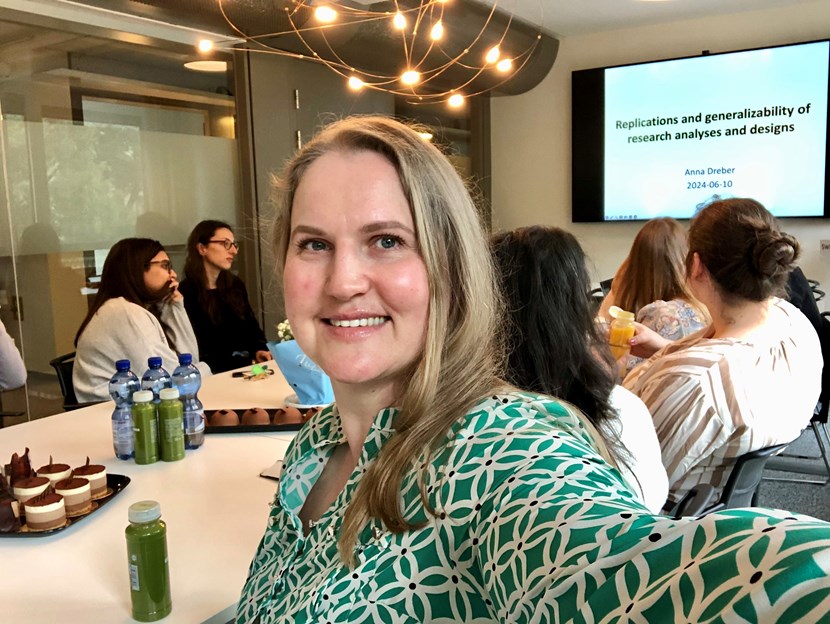Meet Ausra Speer: The PhD Student on a Mission to Close the Gender Gap in Financial Research
Jun. 25, 2024
Ausra is a PhD student dedicated to bridging the gender gap in financial economics. From her journey from Lithuania to the United States, Ausra's commitment to diversity, equity, and inclusion drives her mission. Her "EmpowHERed CollabHERation" project empowers female scholars, fosters collaborative research, and cultivates an inclusive academic environment, enriching the research community.

Can you tell us more about your personal and career background that led you to pursue a PhD in finance?
I was born and raised in Lithuania, which shaped my outlook on life and understanding of economic issues after the Soviet Union's collapse. My family, like many others, felt the long-lasting consequences of Lithuania's struggling economy. As a teenager, I moved to the United States, where the significant cultural differences and economic power profoundly influenced me.
These experiences from two very different countries fueled my desire to study economics and finance. I pursued an undergraduate degree in economics with a specialization in finance from Vytautas Magnus University in Lithuania, traveling back and forth between Lithuania and the US.
Before pursuing a master's degree in financial economics at Middle Tennessee State University, I gained work experience, which provided extensive research experience and prepared me for the real world of finance.
While attending school, I worked for different corporations and eventually joined Vanderbilt University, where I engaged with real-world finance from both corporate finance and asset pricing perspectives. At Vanderbilt, I graduated from the Vanderbilt Leadership Development Program. I eventually left my position as an Assistant Treasurer, managing over $1 billion in working capital, cash, and investments, to pursue a PhD in Finance.
What is your research about?
I've always wanted to research financial crises and stability, focusing on firm preparedness and recovery to develop practical solutions that minimize their severe impacts. Additionally, I'm interested in how diversity, equity, and inclusion (DEI) contribute to financial stability, specifically who is most impacted and how to help.
My research examines financial crises, particularly how corporate governance and culture affect firm performance during and after crises. I'm studying DEI components, measuring their impacts, and identifying key factors.
Currently, I'm finishing my second year of doctoral studies. My project, “Navigating the Storm: How Corporate Culture Impacts Firm Performance Amid Financial Turmoil,” is my first independent research project at SSE.
What inspired you to spearhead the “EmpowHERed CollabHERation” project?
When I joined the SSE PhD program, I wanted to remain actively involved in DEI efforts, particularly in finance and economics. As the DEI representative for 117 doctoral students at SSE, I applied for funding from the Gender Equality Fund to create workshops aimed at female PhD students in economics and finance. These workshops focus on skills development, networking, and collaborative projects, aiming to level the playing field in these historically male-dominated fields.
Diversity among researchers brings diverse perspectives, enabling the development of more creative and effective solutions to financial and economic problems. I feel fortunate to continue this project into its second year alongside Marieke Bos, Deputy Director at SHoF.
How does gender inequality manifest in the financial economic research space?
Gender inequality manifests starkly in financial economics research. A UNC working paper showed that only 14.5% of paper submissions for publication were by women, with even lower representation in finance. At the time of writing, the female-to-male ratio among PhD students in finance and economics at SSE is about 1:3, and among professors, it's 20% in finance and 29% in economics. This project aims to support female scholars by sharing lessons, building skills, and addressing current challenges, ultimately creating more equitable opportunities for career development.
Research indicates that females engage more in research when they have a female instructor. The “EmpowHERed CollabHERation” project aims to fill this void at SSE, ensuring gender equality through collaboration and unity among female PhD students and professors.
Why is it especially important to be more gender equal in financial economics?
Achieving gender equality in financial economics is crucial for several reasons. Firstly, it fosters diverse perspectives, enriching research with varied viewpoints and innovative solutions. This diversity leads to more comprehensive economic policies and financial models. Secondly, gender diversity in academia enhances economic outcomes by improving productivity and profitability. Institutions embracing diversity excel in problem-solving and decision-making, drawing from a broader range of experiences and ideas.
Additionally, women in academia serve as crucial role models, inspiring more young women to pursue careers in economics and finance. Closing gender gaps in these fields not only fosters economic growth but also addresses systemic biases in economic research and policymaking, leading to more inclusive policies benefiting the entire population.
What does “EmpowHERed CollabHERation” do and how can it help close the gap?
The “EmpowHERed CollabHERation” project aims to increase representation, empower female scholars, break gender barriers, foster networking, enhance knowledge exchange, and drive a cultural shift towards a more inclusive environment. These outcomes collectively contribute to achieving gender equality and creating a supportive and diverse academic community at SSE.
This project unites female doctoral students in economics and finance through workshops designed to build essential research skills. The first workshop focused on career paths within finance and economics, featuring female leaders sharing their experiences. The second workshop addressed stress management and mental health, while the third workshop focused on conducting quality research and avoiding retractions.
By addressing the challenges of being a female researcher in male-dominated fields, these workshops aim to ensure that the gender of the author no longer influences the perception of their research. My goal is not to undermine male colleagues but to help female researchers rise to the challenge effectively.
